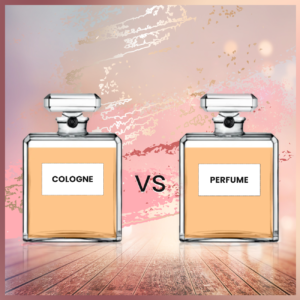Cologne & Perfume Distinction
Whenever we talk about fragrance, two terms often stand out: perfume and cologne. But do you know they both aren’t the same thing? In this blog, we’ll do the fragrance comparisons and distinctions between perfume and cologne, providing you with a better understanding of scent terminology and helping you make an informed choice that complements your personality.
Cologne vs. Perfume
Cologne
- On the other hand, cologne, also referred to as eau de cologne, is a much lighter and more refreshing fragrance option.
- It typically contains 2-4% essential oils, which makes it less intense and more suitable for everyday wear
When Should We Wear It?
Unlike perfume, cologne has a shorter longevity, usually lasting around 2-4 hours on the skin. Its light and refreshing nature makes it perfect for casual outings, hot summer days, or as a post-shower routine.
Perfume
- Perfume, also known as extrait de parfum or parfum, is the most concentrated and potent form of fragrance available in the market.
- It contains the highest percentage of essential oils and can have a concentration of 20-30%, making it incredibly long-lasting, around 24 hours.
When Should We Wear It?
Due to its high concentration, only a small amount is needed to create a lasting impression, making it an excellent choice for formal occasions or when you desire a sophisticated and luxurious scent experience.
Scent Terminology
Understanding the scent terminology is crucial to differentiate between various fragrance products. Here’s a quick breakdown of some common scent-related terms:
Eau de Parfum (EDP): A fragrance with a concentration of 10-20% essential oils, striking a balance between longevity and freshness.
Eau de Toilette (EDT): With a concentration of 5-15% essential oils, EDT offers a moderate fragrance intensity, ideal for regular use.
Eau de Cologne (EDC): As mentioned earlier, EDC contains 2-4% essential oils, offering a light and refreshing scent experience.
Points To Remember
Perfume boasts longevity and intensity, while Cologne offers a refreshing and lighter experience. By grasping the scent terminology, you can decode the nature of different fragrances.
- Choosing between perfume and cologne depends on various factors, including the occasion, personal preferences, and skin chemistry.
- If you prefer a long-lasting, powerful fragrance for special events or want to make a bold statement, opt for perfume.
- If you’re seeking a light, casual scent for everyday use, cologne would be a more suitable option.
So, embrace the world of fragrances, and let your personality shine through the scent you wear!
